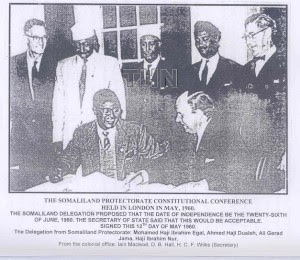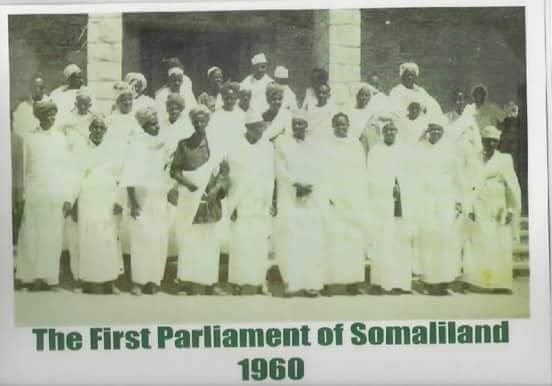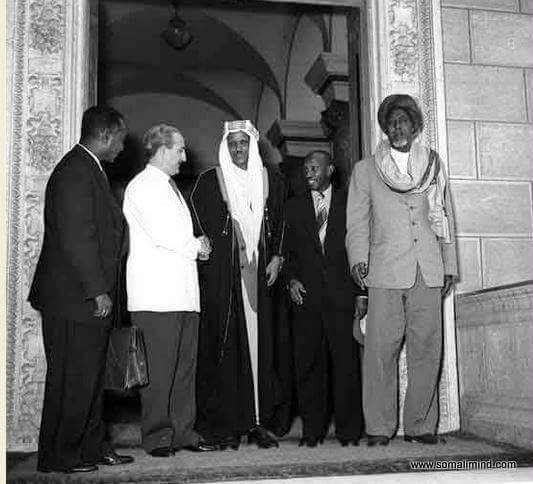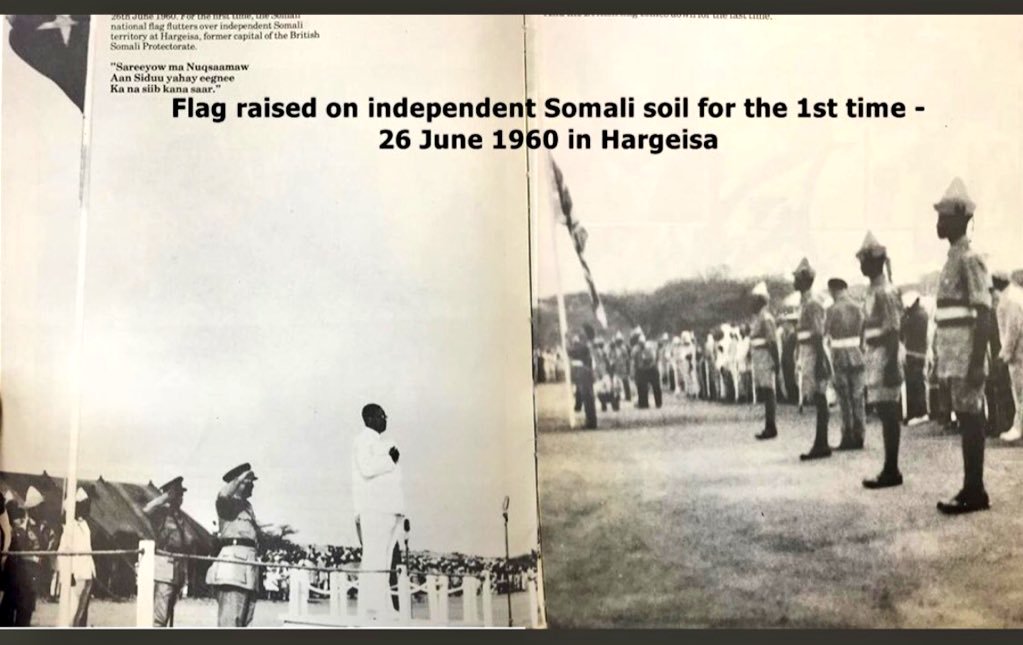By Abdulaziz Al-Mutairi
• Today, many people including persuaded Somalis try to put the Somali history into their own tribal desire. Many of such individuals are optimistic to eliminate the history of Somaliland and 26th June 1960 event that took place.
They, usually, misuse the poems and songs of Somaliland´s Independence Day like a poem of Abdullah Sultan Timacadde (Kana Siib Kana Saar) and Song of (Yusuf Hajji Adan Qabile) in addition to many others. These poems/songs were exclusively for Somaliland cause and its independence as a separate state to south Somalia.
The history archives evidently highlight the existence of Somaliland, and 34 countries recognized Somaliland after independence from Great Britain. The people of Somaliland merely handed over their independence and country to Italian Somalia. Many Somalilanders consider 1st July 1960 as “Black Day in Somaliland History”.
Somaliland Prime Minister Mohammed Ibrahim Egal stepped down for the cause of Somali unity. This was the first African leader steps down for interest of cause but unfortunately, Italian Somalia did not respect such a courageous step. Prime Minister Egal headed Somaliland´s first Council of Ministers which contained four elected ministers and prime minister. Great Britain invited Somaliland to Common Wealth after 26th June 1960.
British Somaliland Protectorate held Legislative assembly elections on 17th Feb 1960 between political parties including SNL (Somali National League) lead by HAJJI IBRAAHIM CIGAAL + NUF (National United Front) lead by MICHAEL MARIANO ALI and USP (United Somali Party) lead by GARAD ALI JAAMAC. SNL won the election with ( 42,000 votes ) + USP had ( 13,000 votes ) +and NUF had ( 22,000 votes ) 2nd largest overall in terms of public vote. SNL and USP formed an alliance called SNL/USP. USP, mainly, had wide supporters in Eastern and Western regions of Somaliland (Awdal and Sool). While NUF primary had major votes in ( sanaag, togdheer and Aynaba region ). Between those three polotical parties combined together had 42,000 + 22,000 + 13,000 = 77,000 votes in total.
First Somaliland Political Party was formed in 1936 under the slogan of SNS (Somali National Society) but unfortunately, this party disappeared after modern parties emerged including SNL, NUF (Nafta) and USP in 1945-1958. NUF supported Somaliland to remain under British Protectorate for another 10 years in order for the British to build schools, roads, hospitals and other infrastructure. British Government accepted the condition but SNL/USP and even the public did not understand the splendid idea of NUF leader Michael Mariano Ali philosophy.
Hajji Omer Askar and Mohammed Ibrahim Egal served as President and General Secretary of SNL. Egal was elected from Berbera and he served also as General Secretary of SNL Branch in Berbera. Michael Mariano and Ahmed Hassan served as President and General Secretary of NUF. Garad Ali Garad Jama also led USP.

The successful SNL, led by Mohammed Egal demanded quick independence. He boycotted the earlier elections of Somaliland Legislative, and his victory was aired by Cairo radio as a slap in the face for imperialism. But Egal, 29 years old, was not expert in fledgling independence, because was not able to stop the failed unity with Italian Somalia.
The people of Somaliland are suffering until today, from that fake unity with Italian Somalia.
On 1943, Her Majesty the Queen of England and Wales offered Somaliland leaders to bring Somali-speaking areas like Hawd and Reserve Area (5th Region of Ethiopia) and NFD (Northern Frontier District) under Somaliland administration, but Somalilanders who were enthusiastic to independence turned down the offer and demanded the expulsion of British from Somaliland.
British handed over the Reserve Area (Part of 5th Region of Ethiopia) to Ethiopian Emperor Haile Salasa on 1954. Somalilanders expressed disappointment during the handover of the area to Ethiopia and all people wore white sheet (Weer Cad) around their head to express bad-feelings. Reserve Area was under British Somaliland control.
Hassan Hashi Elmi, Brother of Politician Mohammed Hashi Elmi, was head of Somaliland´s Field Force located in Awaare District (Reserve Area) before handover. Field Forces were patrolling forces to protect the border with Ethiopia. Field Forces were part of Somaliland Police commissioned by Jama Qorsheel.
Former Somaliland Parliament Speaker Late Ahmed Mohamed Aden Qaybe worked as General Secretary of Somaliland´s first cabinet who visited Ethiopia to negotiate over freedom of Hawd and Reserve Area with Ethiopian Emperor Haile Salasa.
Qaybe wrote on Qarannews that Vice Minister of Interior Affairs of Ethiopia Abdurrahman Mohamed Sayed Abdullah Hassan (The son of Mad Mullah Sayed Abdullah Hassan) was sitting next to Haile Salasa and opposed the proposed freedom of Somali dominated areas in Ethiopia.
Today, we are witnessing so-called political and religious groups calling for the independence of 5th Region of Ethiopia; even some people believe The Mad Mulla was their own hero.
British Governors of Somaliland:
I. Oct 1919 – 17 Aug 1922 Geoffrey Francis Archer
II. 17 Aug 1922 – 29 Nov 1925 Gerald Henry Summers
III. 26 Jan 1926 – 18 Jun 1932 Sir Harold Baxter Kittermaster
IV. 18 Jun 1932 – 2 Mar 1939 Sir Arthur Salisbury Lawrance
V. 2 Mar 1939 – 18 Aug 1940 Vincent Goncalves Glenday
VI. 29 Mar 1941 – 3 Mar 1943 Arthur Reginald Chater
VII. 3 Mar 1943 – 15 Nov 1948 Gerald Thomas Fisher
VIII. 1948 – Feb 1954 Gerald Reece (from 1950, Sir Gerald Reece)
IX. Feb 1954 – 1959 Theodore Ouseley Pike (from 1956, Sir Theodore Ouseley Pike)
X. 11 Jul 1959 – 26 Jun 1960 Sir Douglas Hall
After Independence Day:
On 2nd May 1960, Somaliland cabinet led by Mohamed Ibrahim Egal met with their counterparts in London, England and held ten days meeting. The meeting was to grant independence to Somaliland – as an independent State. The British government agreed on independence on 26th June 1960.
Somaliland celebrated for the long waited independence and installed the Somaliland Flag for the first time on 26 June Center (near the Central Jail of Hargeisa). Somaliland government constructed a mosque in the centre now. This is an attempt to erase the old bad memories of the failed unity with Somalia.
Unfortunately, after four days Somalilanders joined Italian Somalia to form the Somali Republic. Somalilanders had no experience of unity and only wanted to see United Somali starting from NFD of Kenya to French Somaliland (Djibouti).
Somaliland was deceived by their trusted brothers in Italian Somalia including power sharing. All important projects went to south Somalia without considering the need for Somaliland to development. Only, after two months from the unity, the Somalilanders were disappointed with the response from their brothers in South.








